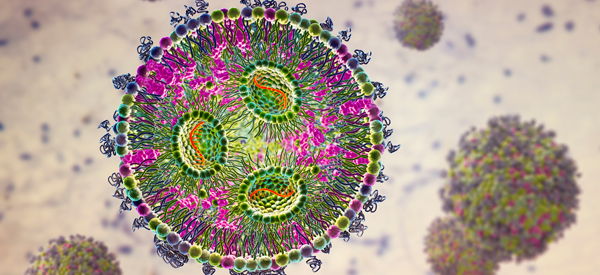Thermostable mRNA vaccines promise improved protection against COVID-19
Messenger RNA (mRNA) lipid nanoparticle (LNP) vaccines for COVID-19 have been effective at preventing severe disease in high-income countries. However, they have had a limited impact in low- and middle-income countries, leaving many communities at risk for future outbreaks. This global disparity is largely due to a lack of cold-chain-compatible storage and transport in poorer geographies, and is compounded by insufficient numbers of healthcare personnel, highlighting the need for a thermostable and more easily administered COVID-19 vaccine format. To address this requirement, a team of US researchers has developed an automated process for printing mRNA-LNP vaccines into microneedle patches (MNPs). Their data, published in Nature Biotechnology, show MNPs to be stable for at least six months at room temperature and to stimulate robust in vivo immune responses to the SARS-CoV-2 spike protein.

Microneedle vaccine printer design overcomes MNP manufacturing challenges
MNPs offer many advantages as a vaccine delivery system: they can be self-applied, cause less discomfort than an intramuscular injection, produce no sharps waste, and can be formulated to remain shelf stable for months. Yet their development has been hampered by manufacturing challenges, which include fabricating dissolvable microneedles that are both sharp and consistent in size and loading accurate vaccine doses. To overcome these issues, Vander Straeten et al. developed a vacuum-based device for driving viscous vaccine inks into polydimethylsiloxane (PDMS) molds. This initially involved comparing different methods for dispensing and drying a polymer solution, which resulted in a first-generation printer capable of manufacturing 100 MNPs in 48 hours and provided scope to increase throughput.
Optimization for biologics
Because LNPs are notoriously difficult to dry in a solid matrix without compromising the chemical and colloidal stability, Vander Straeten et al. next compared the impact of various biocompatible polymers on mRNA-LNPs encoding for firefly luciferase (fLuc). The fLuc mRNA was provided by TriLink. First, the mRNA-LNPs were mixed with each polymer and dried prior to redissolution and transfection of HeLa cells to allow for measurement of fLuc expression relative to fresh (undried) LNPs. Next, the best polymer formulation (a 1:1 mass ratio of PVP:PVA) was used for loading fLuc mRNA-LNPs into MNP microneedles for murine footpad application. Key findings from the in vivo study included the observation that protein expression was comparable between manually fabricated MNPs and those produced with the microneedle vaccine printer and the discovery that expression levels in MNP-dosed animals were significantly higher at 24 hours compared to animals that received fLuc mRNA-LNPs via intramuscular injection.
MNP dissolution, immunogenicity, and stability
To further characterize and improve MNPs featuring the optimized polymer combination, Vander Straeten et al. performed additional testing. This included ex vivo histological analysis of pig skin, which showed pyramid MNPs to outperform conical MNPs in terms of skin puncture, and in vivo administration of fLuc mRNA-LNPs that had been stored for six months at room temperature or one month at 37 °C, which showed storage to have had no impact on potency. In addition, MNPs containing TriLink-manufactured mRNA encoding for the receptor-binding domain (RBD) of the SARS-CoV-2 spike protein were administered intradermally to mice, where they produced anti-RBD IgG titers indicative of a robust immune response, even after long-term (3 months) storage at room temperature.
Future perspectives
Using a microneedle vaccine printer to produce MNPs with long-term thermostability is a promising approach to protect communities in low- and middle-income countries against COVID-19. In their concluding comments, Vander Straeten et al. suggest that their device could be easily adapted to any mRNA vaccine and scaled up to meet specific needs, including tackling the emergence of new SARS-CoV-2 variants or other infectious diseases.
Related Products:
Article reference: Vander Straeten A, Sarmadi M, Daristotle JL, et al. A microneedle vaccine printer for thermostable COVID-19 mRNA vaccines. Nat Biotechnol. 2023;10.1038/s41587-023-01774-z.


